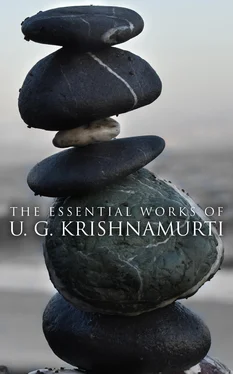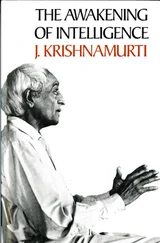U. Krishnamurti - The Essential Works of U. G. Krishnamurti
Здесь есть возможность читать онлайн «U. Krishnamurti - The Essential Works of U. G. Krishnamurti» — ознакомительный отрывок электронной книги совершенно бесплатно, а после прочтения отрывка купить полную версию. В некоторых случаях можно слушать аудио, скачать через торрент в формате fb2 и присутствует краткое содержание. Жанр: unrecognised, на английском языке. Описание произведения, (предисловие) а так же отзывы посетителей доступны на портале библиотеки ЛибКат.
- Название:The Essential Works of U. G. Krishnamurti
- Автор:
- Жанр:
- Год:неизвестен
- ISBN:нет данных
- Рейтинг книги:5 / 5. Голосов: 1
-
Избранное:Добавить в избранное
- Отзывы:
-
Ваша оценка:
- 100
- 1
- 2
- 3
- 4
- 5
The Essential Works of U. G. Krishnamurti: краткое содержание, описание и аннотация
Предлагаем к чтению аннотацию, описание, краткое содержание или предисловие (зависит от того, что написал сам автор книги «The Essential Works of U. G. Krishnamurti»). Если вы не нашли необходимую информацию о книге — напишите в комментариях, мы постараемся отыскать её.
Content:
The Mystique of Enlightenment
Courage to Stand Alone
Mind is a Myth
No Way Out
Thought is Your Enemy
The Natural State
The Essential Works of U. G. Krishnamurti — читать онлайн ознакомительный отрывок
Ниже представлен текст книги, разбитый по страницам. Система сохранения места последней прочитанной страницы, позволяет с удобством читать онлайн бесплатно книгу «The Essential Works of U. G. Krishnamurti», без необходимости каждый раз заново искать на чём Вы остановились. Поставьте закладку, и сможете в любой момент перейти на страницу, на которой закончили чтение.
Интервал:
Закладка:
Q: In the entire universe?
UG:That is too big, you see. Anything that is happening within your field of consciousness. Consciousness is, of course, not limited. If he is hurt there, you also are hurt here. If you are hurt, there is an immediate response there. I can't say about the universe, the whole universe, but in your field of consciousness, in the limited field in which you are operating at that particular moment, you are responding — not that you are responding.
And all the other glands also here.... There are so many glands here; for example, the pituitary — 'third eye', ajña chakra, they call it. When once the interference of thought is finished, it is taken over by this gland: it is this gland that gives the instructions or orders to the body; not thought any more; thought cannot interfere. (That is why they call it that*, probably. I'm not interpreting or any such thing; perhaps this gives you an idea.) But you have built an armor, created an armor with this thought, and you don't allow yourself to be affected by things.
______________
The literal meaning "ajña" is "command."
______________
Since there is nobody who uses this thought as a self-protective mechanism, it burns itself up. Thought undergoes combustion, ionization (if I may use your scientific term). Thought is, after all, vibration. So, when this kind of ionization of thought takes place, it throws out, sometimes it covers the whole body with, an ash-like substance. Your body is covered with that when there is no need for thought at all. When you don't use it, what happens to that thought? It burns itself out — that is the energy — it's a combustion. The body gets heated, you know. There is tremendous heat in the body as a result of this, and so the skin is covered — your face, your feet, everything — with this ash-like substance.
That's one of the reasons why I express it in pure and simple physical and physiological terms. It has no psychological content at all, it has no mystical content, it has no religious overtones at all, as I see it. I am bound to say that, and I don't care whether you accept it or not, it is of no importance to me.
_______
This kind of a thing must have happened to so many people. I say this happens to one in a billion, and you are that one in a billion. It is not something that one is specially prepared for. There are no purificatory methods necessary, there is no sadhana necessary for this kind of a thing to happen — no preparation of any kind. The consciousness is so pure that whatever you are doing in the direction of purifying that consciousness is adding impurity to it.
Consciousness has to flush itself out: it has to purge itself of every trace of holiness, every trace of unholiness, everything. Even what you consider 'sacred and holy' is a contamination in that consciousness. It is not through any volition of yours; when once the frontiers are broken — not through any effort of yours, not through any volition of yours — then the floodgates are open and everything goes out. In that process of flushing out, you have all these visions. It's not a vision outside there or inside of you; suddenly you yourself, the whole consciousness, takes the shape of Buddha, Jesus, Mahavira, Mohammed, Socrates — only those people who have come into this state; not great men, not the leaders of mankind — it is very strange — but only those people to whom this kind of a thing happened.
One of them was a colored man (not exactly a colored man), and during that time I could tell people how he looked. Then some woman with breasts, flowing hair — naked. I was told that there were two saints here in India — Akkamahadevi and Lalleswari — they were women, naked women. Suddenly you have these two breasts, the flowing hair — even the organs change into female organs.
But still there is a division there — you, and the form the consciousness has assumed, the form of Buddha, say, or Jesus Christ or God knows what — the same situation: "How do I know I am in that state?" But that division cannot stay long; it disappears and something else comes. Hundreds of people — probably something happened to so many hundreds of people. This is part of history — so many rishis, some Westerners, monks, so many women, and sometimes very strange things. You see, all that people have experienced before you is part of your consciousness. I use the expression "the saints go marching out"; in Christianity they have a hymn "When the Saints Go Marching In." They run out of your consciousness because they cannot stay there any more, because all that is impurity, a contamination there.
You can say (I can't make any definite statement) probably it is because of the impact on the human consciousness of the 'explosions' of all those saints, sages and saviours of mankind that there is this dissatisfaction in you, that whatever is there is all the time trying to burst out, as it were. Maybe that is so — I can't say anything about it. You can say that they are there because they are pushing you to this point, and once the purpose is achieved they have finished their job and they go way — that is only speculation on my part. But this flushing out of everything good and bad, holy and unholy, sacred and profane has got to happen, otherwise your consciousness is still contaminated, still impure. During that time it goes on and on and on — there are hundreds and thousands of them — then, you see, you are put back into that primeval, primordial state of consciousness. Once it has become pure, of and by itself, then nothing can touch it, nothing can contaminate that any more. All the past up to that point is there, but it cannot influence your actions any more.
All these visions and everything were happening for three years after the "calamity." Now the whole thing is finished. The divided state of consciousness cannot function at all any more; it is always in the undivided state of consciousness — nothing can touch that. Anything can happen — the thought can be a good thought, a bad thought, the telephone number of a London prostitute.... During my wanderings in London, I used to look at those telephone numbers fixed to the trees. I was not interested in going to the prostitute, but those things, the numbers, interested me. I had nothing else to do, no books to read, nothing to do but look at those numbers. One number gets fixed in there, it comes there, it repeats itself. It doesn't matter what comes there — good, bad, holy, unholy. Who is there to say "This is good; that is bad?" — the whole thing is finished. That is why I have to use the phrase 'religious experience' (not in the sense in which you use the word 'religion'): it puts you back to the source. You are back in that primeval, primordial, pure state of consciousness —call it 'awareness' or whatever you like. In that state things are happening, and there is nobody who is interested, nobody who is looking at them. They come and go in their own way, like the Ganges water flowing: the sewerage water comes in, half-burnt corpses, both good things and bad things — everything — but that water is always pure.
_______
The most puzzling and bewildering part of the whole thing was when the sensory activities began their independent careers. There was no co-ordinator linking the senses, so we had terrible problems — Valentine had to go through the whole business. We'd go for a walk, and I'd look at a flower and ask "What is that?" She'd say "That is a flower." I'd take a few more steps, look at a cow and ask "What is that?" Like a baby, I had to relearn everything all over (not actually relearn, but all the knowledge was in the background and never came to the forefront, you see). It started — the whole business — "What is this crazy business?" I have to put it in words; not that I felt I was in a crazy state. I was a very sane man, acting sanely, everything going on, and yet this ridiculous business of asking about everything "What is this? What is that?" That's all; no other questions. Valentine also didn't know what to make out of the whole business. She even went to a leading psychiatrist in Geneva. She rushed to him — she wanted to understand, but at the same time she felt that there was nothing crazy about me. If I'd done one crazy thing she would have left me. Never; only strange things, you see. "What is that?" "That is a cow." "What is that?" "That is that." It went on and on and on, and it was too much for her and too much for me. When she met the psychiatrist, he said "Unless we see the person, we can't tell anything. Bring him." But I knew that something really fantastic had happened inside — what it was, I didn't know, but that didn't bother me. "Why ask if that's a cow? What's the difference whether it is a cow, a donkey or a horse?" — that bewildering situation continued for a long time — all the knowledge was in the background. It's the same situation even now, but I don't ask those questions any more. When I am looking at something, I really don't know what I'm looking at — that is why I say it is a state of not knowing. I really don't know. That is why I say that once you are there, through some luck, some strange chance, from then on everything happens in its own way. You are always in a state of samadhi; there is no question of going in and out of it; you are always there. I don't want to use that word, so I say it is a state of not knowing. You really don't know what you are looking at.
Читать дальшеИнтервал:
Закладка:
Похожие книги на «The Essential Works of U. G. Krishnamurti»
Представляем Вашему вниманию похожие книги на «The Essential Works of U. G. Krishnamurti» списком для выбора. Мы отобрали схожую по названию и смыслу литературу в надежде предоставить читателям больше вариантов отыскать новые, интересные, ещё непрочитанные произведения.
Обсуждение, отзывы о книге «The Essential Works of U. G. Krishnamurti» и просто собственные мнения читателей. Оставьте ваши комментарии, напишите, что Вы думаете о произведении, его смысле или главных героях. Укажите что конкретно понравилось, а что нет, и почему Вы так считаете.












